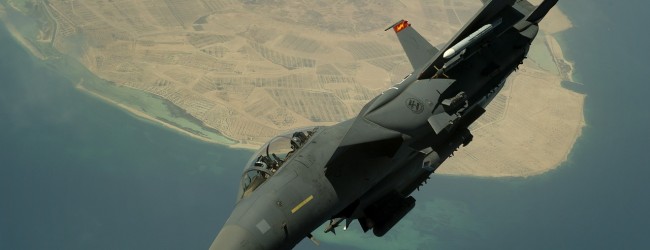
Behind the backs of the American people and excluded from discussion in the ongoing election campaign, the United States has in recent weeks sharply escalated its military standoff with China.
On Thursday, the New York Times reported in an editorial that the United States will shortly conduct a third “freedom of navigation” exercise in the South China Sea, sailing warships within 12 nautical miles of territory claimed by China.
In the first two such incidents, which took place in October 2015 and January 2016, the US Navy sent guided missile destroyers into Chinese territorial waters in nominal adherence to the rules of “innocent passage,” which prohibit “any exercise or practice with weapons of any kind.”
According to a report in the Navy Times, Admiral Harry Harris, commander of US Pacific forces, is pushing for more aggressive action within 12-mile exclusion zone around Chinese-held territory.
Bryan Clark, a former senior aide to retired Admiral Hon Greenert, the recently retired chief of naval operations, told the Navy Times that Harris “wants to do real [freedom of navigation] operations. He wants to drive through an area and do military operations”—such as launching aircraft and firing weapons’ systems.
As a result of escalating tensions, the New York Times editorial concluded, menacingly, that “some sort of confrontation seems increasingly likely.”
In advancing its anti-China strategy, the US has recruited the leading powers in the Asia-Pacific, Japan and Australia, as well as countries such as the Philippines, Singapore, Vietnam, Malaysia and Indonesia, who are rapidly developing their naval forces and are themselves carrying out increasingly provocative operations against China.
A report published this week by the Stockholm International Peace Research Institute revealed a vast increase in military spending by US allies in the Asia-Pacific region. The Philippines increased spending by 25.5 percent in a single year, followed by Indonesia with 16.5 percent, while Thailand, Singapore, Malaysia, and Vietnam each increased spending by more than five percent.
This anti-China alliance has been increasingly assertive in its maritime claims. The Times noted: “Last week, Vietnam seized a Chinese ship for illegally entering its territorial waters, and Indonesia threatened to defend its own claims with F-16 fighter jets.”
This week, the US Navy and Marines deployed 5,000 troops for an ongoing major military exercise with the Philippines. Foreign Affairs magazine noted: “The drills, which got underway this week, include an amphibious landing on the Philippines coast and a mock assault on an oil rig, with a small contingent of Australian forces also participating.” On Tuesday, Japan announced that it would send a helicopter destroyer through the South China Sea to take part in the exercises.
Japan, which carried out some of the greatest war crimes in modern history against the people of China, is rapidly remilitarizing. Earlier this month, a reinterpretation of Japan’s pacifist constitution went into force, legitimizing the Japanese government to fight alongside the US on the pretext of “collective self defense.” Going even further, Prime Minister Shinzo Abe said earlier this week that the country’s constitution allows Japan, a quarter of a million of whose people died in the bombing of Hiroshima and Nagasaki by the United States in 1945, to possess and use nuclear weapons.
The Chinese regime, meanwhile, is under increasing pressure to respond more strongly to US aggression. Hu Bo, a Research Fellow at the Institute of Ocean Research of Peking University, urged in an article published this month by the Diplomat: “In the face of U.S. military operations in the South China Sea, China naturally should be prepared militarily.” He added: “China should adopt and apply all options to counter and expose the traps set by the U.S. through such military operations.”
With tensions escalating on both sides, a US freedom of navigation operation, or even one of the daily, and mostly unreported, conflicts between military and fishing vessels in the South China Sea, or even an “accident” such as a recent fly-over by a US nuclear-capable B-52 bomber over Chinese territory, could rapidly lead to a full-scale military exchange, possibly including nuclear weapons.
The potential of military conflict between “great powers” has rapidly become the central preoccupation of the US military. In an extraordinary statement, Army Chief of Staff Gen. Mark Milley told a Senate Armed Services Committee hearing Thursday that the US is at “high risk” from the “potential for great power conflict… and the cost in terms of casualties.”
Despite these frank statements by leading military personnel and the New York Times of the danger of a “great power” military conflict—that is, world war—these issues have been totally excluded from the 2016 presidential elections. Based on what the candidates are saying, one would never know that the United States and China are coming ever-closer to an open military clash.
There is a history in America of major military escalations immediately following elections. Woodrow Wilson, who won reelection in 1916 on the slogan that “He kept us out of war,” took the United States into World War I on April 2, 1917. Lyndon B. Johnson, who ran as the peace candidate in the 1964 election, carried out a vast escalation of the war in Vietnam within months of taking office.
Regardless of whether a Democrat or Republican becomes president next year, there is a very real danger that in the immediate aftermath of the election, if not before, the US will be engaged in a major military confrontation with China, Russia, or in the Middle East.
The Socialist Equality Party, in solidarity with the International Committee of the Fourth International, is determined to alert the working class and youth to the immense danger of war and place this issue at the center of the 2016 elections.
Andre Damon
You must be logged in to post a comment.